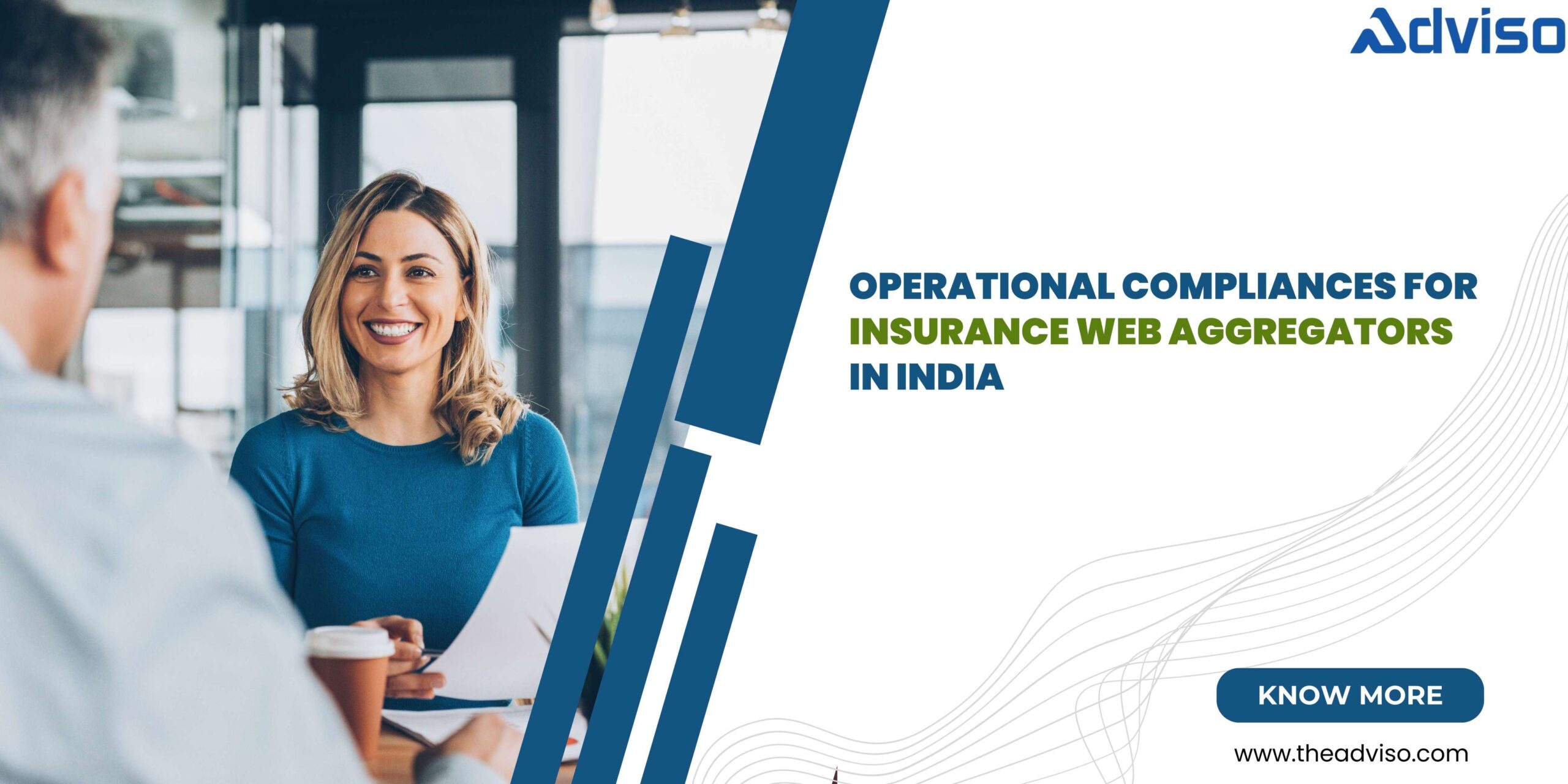Insurance Web Aggregators in India
For the insurance sector, digitization came as a boon, surpassing its reach deeper into diverse demographics, leading to an astonishing demand for insurance products. Insurance web aggregators are among the key contributors to the ever-thriving Insurance sector. From easing decision-making for policy-seekers to providing KYC facilities, Insurance web aggregators serve as a single window for insurance-related solutions. They have transformed the way insurance products are marketed and sold.
Insurance web aggregators have a dedicated web portal that helps customers opt for an ideal policy befitting their requirements and budget. To operate as an insurance web aggregator, one must comply with the Insurance Web Aggregators Regulations, 2017 concerning operation and management. This blog explores operational compliances for Insurance Web Aggregators in India.
Corporate Governance Norms for Insurance Web Aggregators in India
Corporate governance ensures that Insurance Web Aggregators operate as ethically as possible, preserving the interest of stakeholders and policyholders. Some notable considerations in this context include:
1. Board-Approved Policies
Every Insurance Web Aggregator must outline clear-cut policies concerning:
- Product solicitation
- Strategic Tie-ups
- Grievance redressal mechanisms
- Reporting
The board must ensure periodic assessment of these policies, at least once every three years to cope with the ever-changing regulatory landscape and market dynamics.
2. Conflict of Interest
Insurance Web Aggregators in India leveraging various insurer tie-ups must:
- Reveal the list of insurers and their products.
- Transparently provide comprehensive information on the products’ scope, premium terms, etc.
- Avoid putting stress on a particular insurance product for the sake of profit.
Check out our stories: Top 7 IRDAI License Services in India
3. Professional Indemnity Insurance
Every registered insurer should leverage professional indemnity insurance to ensure protection against liabilities arising from errors or omissions. New registrants must obtain it within six months of registration.
4. Maintenance of Books and Records
Insurance Web Aggregators in India must document every aspect that influences their day-to-day operations, including:
- Financial statements such as balance sheets and income statements.
- Details for all solicited insurance policies. Categorize this info policy-wise and verifier-wise.
- Details concerning income coming from insurers and related entities.
These records should remain accessible during audits as and when required.
5. Role of Principal Officers
The Principal Officer (PO) refers to a key managerial person who makes major decisions that influence the company’s operations. They are also responsible for ensuring compliance with IRDAI norms. PO must
- Hold qualifications and skills as per the Form C of the regulations.
- Have undergone mandatory training to pursue tasks tied to the designation seamlessly.
- Avoid any external affiliations, thus exclusively focusing on the aggregator’s operations.
Operational Requirements for Insurance Web Aggregators in India
Maintaining optimal operational efficiency signifies that an aggregator is being transparent with their operation and has holistic control over compliances. The frontline regulations that govern the aggregator’s operations include:
1. Designated Website
Insurance Web Aggregators in India must have a dedicated web portal or website, exclusively designed to render aggregation services. This website must:
- Boast a user-friendly interface that allows a seamless comparison between insurance products, leading to hassle-free decision-making.
- Comply with norms (concerning content and structure) enacted by the IRDAI.
- Avoid solicitation of any products or services, staying neutral from a commercial standpoint.
2. Lead Management System (LMS)
A robust Lead Management System must be integrated with the platform. It will cater to numerous tasks, such as:
- Recording and verification of leads generated on the portal.
- Securing and addressing customer information.
- Delegating leads to apt personnel and following up the same
3. Capital and Net Worth Requirements
Insurance Web Aggregators in India must meet the given financial compliances to reinforce economic stability:
- Minimum paid-up capital: Rs. 25 lakhs.
- Net worth is equivalent to 100% of the minimum capital requirement throughout the registration period.
Aggregators must annually prompt the authority about their financial standing by sharing the net worth certificate attested by the Chartered Accountant.
4. Telemarketing and Distance Marketing
Insurance Web Aggregators in India must secure the IRDAI approval beforehand when planning to engage in telemarketing and distance marketing. These endevours must be performed by certified Authorized Verifiers, who acts as an aggregator’s representatives.
5. Certificate of Registration (COR)
To maintain legal vitality, aggregators must secure and periodically renew the registration conferred by the IRDAI. Key details include:
- Initial application filed in Form A attached with a standard fee worth Rs 10,000.
- The renewal application must be filed within 30 days before expiry, with a standard fee worth Rs 25,000.
- Once renewed, the certification must remain valid for three years.
6. FDI Norms
There is a limit to the FDI threshold maintained in the aggregator business. As per the IRDAI, the FDI threshold should not surpass 49% of the paid-up equity capital. This incentivizes overseas participation while Indian ownership and control.
Ensuring Compliance: Key Responsibilities
1. Code of Conduct
Every aggregator must comply with the code of conduct detailed in Form W of the regulations. Some notable rules include:
- Baised and ambiguous practices are not allowed, be it a matter of providing information or maintaining financial health.
- Facilitation of misleading information can invite stringent penalties
- Ensuring utmost customer confidentiality is paramount.
2. Grievance Redressal
Insurance Web Aggregators in India must establish robust grievance redressal mechanisms, ensuring peace of mind for policyholders. Once lodged, the complaint must be resolved within 14 days of the encounter. How complaints are addressed, managed, and resolved must be periodically shared with IRDAI to reinforce operational vitality.
3. Regulatory Disclosures
Half-yearly returns should be mandatorily submitted to IRDAI to ensure compliance. Each return must reflect:
- Insurer-wise business placed.
- Financial and operational updates.
Disclosing these details is paramount via returns to avoid penalties or suspension of registration.
4. Challenges and Opportunities
Challenges
- Regulatory Compliance: Staying updated with frequent regulatory changes can be daunting.
- Data Security: Protecting customer information in the digital age is a significant challenge.
- Competition: The market is becoming increasingly crowded, necessitating innovation to stand out.
Opportunities
- Customer Trust: Adhering to governance norms builds credibility and trust.
- Digital Transformation: Leveraging technology to enhance customer experience and operational efficiency.
- Expansion: FDI allowances enable aggregators to access foreign expertise and capital.
FAQs on Corporate Governance for Insurance Web Aggregators
1. What is the primary role of the Principal Officer in an Insurance Web Aggregator?
The Principal Officer oversees compliance with regulatory norms and ensures the aggregator’s operations align with IRDAI guidelines.
2. Can an Insurance Web Aggregator advertise other products on its platform?
No, advertising non-insurance products or services is strictly prohibited.
3. What happens if an aggregator’s net worth falls below the required level?
The aggregator must restore its net worth promptly. Failure to do so can lead to suspension of registration.
4. Are aggregators allowed to favor specific insurers?
No, Insurance Web Aggregators in India must maintain neutrality and provide unbiased comparisons of insurance products.
5. What is the validity period of the Certificate of Registration?
The COR is valid for three years and must be renewed before expiry.
Conclusion
Insurance Web Aggregators in India are a compliance-intensive business and thus are difficult to maintain. The overview above is just a snapshot of key compliances and hence it does not portray the entire picture. The IRDAI, every now and then, released fresh guidelines to foster a regulated environment.
Coping these norms can be taxing if not downright difficult. That’s why partnering with legal consultancy service providers like Adviso is paramount. Being a frontrunner in the compliance realm, Adviso has transformed the way businesses deal with compliances. Adviso’s services shall keep your business compliant and afloat no matter how complicated the regulations are.
Also Read: Understanding IRDAI Regulations For Web Aggregators




